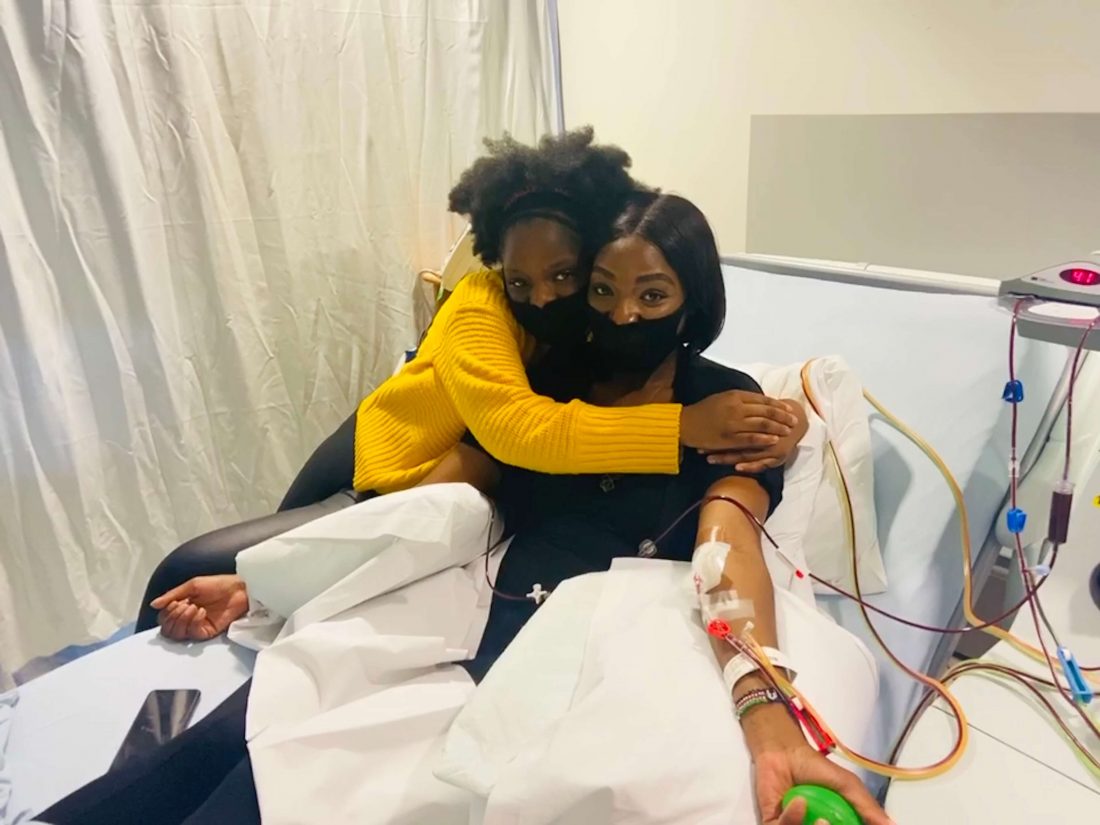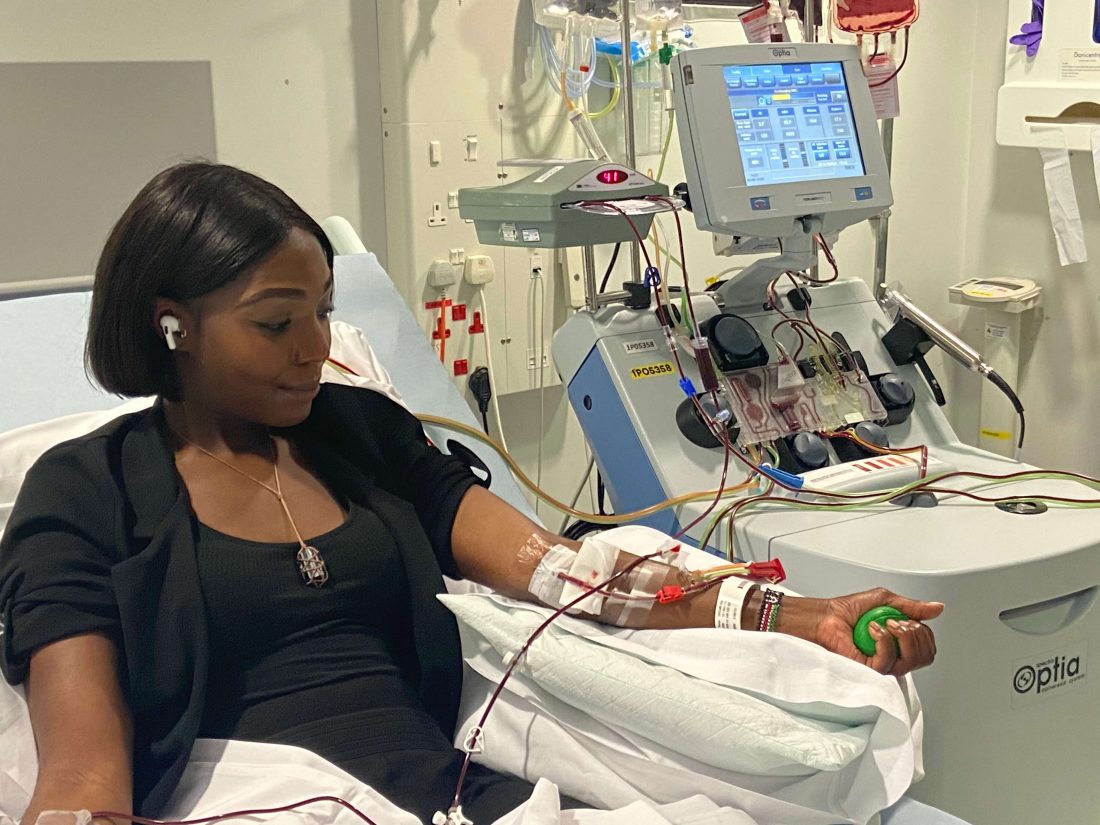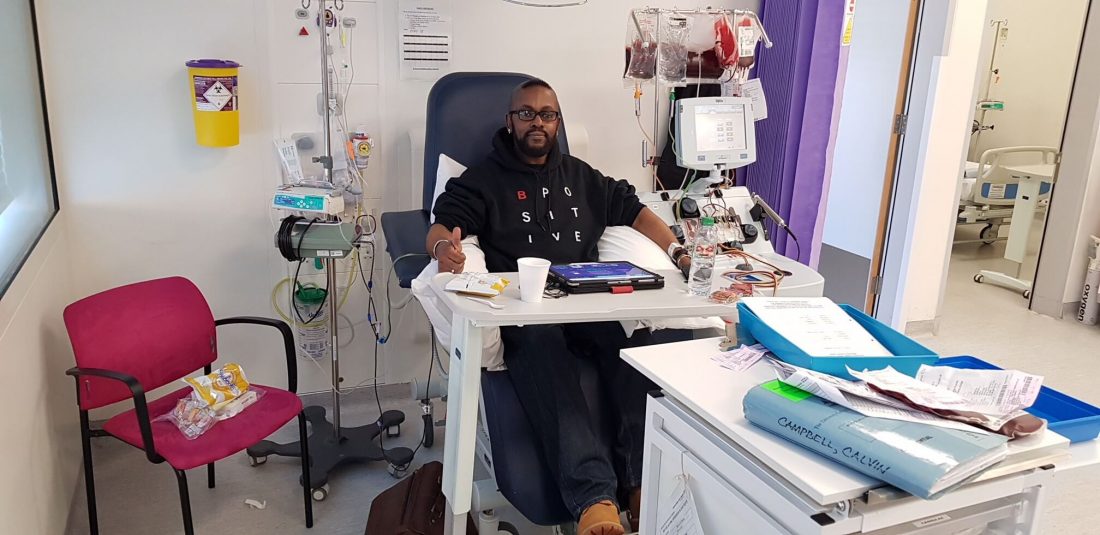What’s it like being a single parent mum who has sickle cell disease? Chanel Taylor exclusively shares her story with Melan on how she juggles living with the illness with motherhood and why she started her platform Unsickle My Cell to support others.

Once Chanel Taylor had her first exchange blood transfusion treatment for sickle cell disease (SCD), its energising effects were immediate and unexpected.
“I always use the example of Popeye because I really felt like I’d had my spinach that day,” she laughed on the telephone.
An exchange transfusion is a procedure that replaces sickle blood with non-sickle blood from a donor.
By replacing the patient’s sickle-shaped cells with normal blood cells, the oxygen circulation around the body is improved and complications of sickle cell are reduced, the NHS Blood and Transplant Service explains.
She added: “A couple of hours later I literally jumped up and my friend and the nurses were like, ‘No, no, no, Chanel, sit down! You can’t do that!’ but I felt like I could do cartwheels. I felt a spring in my step and really felt the difference.
“I believe in the power of blood exchanges. They give me a better quality of life because within a year, I’ve made progress with the things I’ve done and have managed to do with my daughter…it’s also making me have a better connection with my body in order for me to plan what I can and can’t do with my child, so it’s strengthened our relationship.”
Chanel receives seven units of blood every five weeks so that requires “blood from seven ethnically-matched people to survive”.
Chanel, 36, receives seven units of blood every five weeks so that requires “blood from seven ethnically-matched people to survive”.
Despite first being diagnosed with SCD at nine months old, her exchange transfusions just began in November last year because she wasn’t eligible for the treatment previously. One reason driving that decision is Chanel not being seen at hospital enough which doctors translated as her not being unwell enough, she said.
With her next treatment due soon, Chanel can feel herself getting increasingly fatigued, she told me, so is prepared to be able to do less in the meantime. But she’s preserving enough energy for a well-deserved spa break with 10-year-old daughter Ny’Asia.
Having SCD and being a single parent presents complex challenges like having to plan medical appointments around school hours, which was impossible when schools were closed due to the pandemic, and not always having the physical strength to do what’s expected of a mum. This can bring about feelings of guilt that are tough for a parent.
After years of shielding Ny’Asia from the extent of her SCD, lockdown was a turning point that meant Chanel had to broach her daughter’s feelings about mummy being unwell and open up more herself to show that home is a safe space for honest conversations.

However, being a single parent means the onus is on Chanel to decide when the right time for these discussions are.
“I don’t have that support. Recently a good friend of mine whose daughter is one-year post-chemotherapy treatment, I really confided in her…We’ve spoken about: what do you say and how do you say things and what’s the best approach.
“It’s about being open and natural and normal with your child. When things do happen or you’re in pain, or you need to go to hospital or there’s certain medication you need to take, explain to your child why you need to take them and what pain you’re going through at the time so they understand.”
Red blood cells carry oxygen around the body. In someone with SCD, their blood cells are sickle-shaped so they don’t live as long as healthy blood cells or manoeuvre as easily and can block blood flow to parts of the body, causing debilitating problems.
It’s a life-long illness and as well as “chronic fatigue being a killer” it has damaged Chanel’s eyesight. Sickle cell retinopathy is caused by a lack of oxygen to the back of the eyes. Blood can also leak into the eyes which adds to the blurriness.
“Within the last few weeks, I had a breakdown. I felt so guilty I wasn’t able to wake up and see my child go to school and that hurts..”
She said: “Within the last few weeks, I had a breakdown. I felt so guilty I wasn’t able to wake up and see my child go to school and that hurts. I was that parent who woke up, drove her to school and picked her up, but now I’m unable to do those things because sickle cell has impacted my vision.
“I didn’t realise how much it had impacted me mentally because I’m not driving at the moment and it’s impacting me financially because I’m taking more taxis.
“Me being so tired also, I can’t keep my eyes open or look at a screen for too long or be around bright lights for so long, so it all takes a toll on my body.
“Sickle cell impacts you daily and you have to physically and mentally understand what your body’s going through to figure out your next move. I might be so tired I can’t stand up to cook so I have a perching stool now in the kitchen and I’ll meal prep the night before.”
Even a bra strap or shoelaces being too tight can affect Chanel’s blood flow and cause swelling.
How sickle cell affects a person is linked to their individual triggers but in each case, it weakens their immune system and causes extreme fatigue.

Enlightening people as to the nature and impact of SCD is what Chanel does as an events and outreach officer for the NHS Blood and Transplant Service and being a BAME ambassador.
It’s estimated that between 13,000 and 15,000 people in the UK have sickle cell and it mostly affects people of African and Caribbean origin. However, the NHS Blood and Transplant service reported that less than 5% of its blood donors from the last year were from BAME individuals.
The need for more Black people to become blood, organ and stem cell donors has been well publicised for some time now, so I asked Chanel whether she thinks there’s an accepted ignorance and lack of empathy within our community that we’re not willing to admit to. She agreed.
“I look at the Black Lives Matter marches and how many people, especially Black people, showed up. If we had the same amount of Black people registering to donate blood, I’m not saying the crisis would be over, but that would be one pandemic within the sickle cell community somewhat on the verge of getting better,” she said.
There’s also a cultural ignorance those in the sickle cell community are working hard to dismantle.
For instance, the support Chanel’s grandmother gives her is “second to none”. But as a Ghanaian elder, her understanding of, and “emotional intelligence” towards sickle cell, is typical of someone of that generation from Africa or the Caribbean, where there are beliefs that sickness can be prayed away. Or they might pass a well-intentioned but insulting remark that they will “pray for a cure”.
She said: “In most parts of Africa, having sickle cell is labelled a curse. It’s not spoken about, if anything it’s swept under the carpet and you’re made to feel like you have mental health issues.
“Having sickle cell is debilitating, it’s lonely and can be a dark place, and you don’t often have anybody to talk to other than the sickle cells…”
“With regards to actual mental health issues, they don’t believe you have any because it’s dressed up as ‘you’re a witch’ so they’re not going to take you seriously.
“There are so many contributory factors, but I definitely think it’s down to a lack of education.” Peer-support and education is a major feature of ‘Unsickle My Cells UK’, the community interest company Chanel founded in 2017, originally as a way to combat loneliness. You’ll regularly see her chatting with sickle cell “warriors” on Instagram Live which she beautifully described as an opportunity to “give a voice to the voiceless”.
Sadly, one of those women died in September from SCD. She was a 24-year-old nurse. Her death made Chanel want to “end it all by not doing anything” but at the same time, it’s people like her who drive Chanel to keep going.
She said: “With the #DearSickleCell campaign I partnered with the Blood and Transplant service on, it was a way for me to gather all the warriors together and for them to address sickle cell as though it was a person in a spoken word form, a poem or letter, and them be quite vulnerable which is hard to do.
“Having sickle cell is debilitating, it’s lonely and can be a dark place, and you don’t often have anybody to talk to other than the sickle cells. Sometimes you feel like you’re in a relationship with it.”
The next step is working with Wandsworth Borough Council to find a venue to become a hub for people with SCD and other invisible health conditions.
She added: “Through Unsickle My Cells UK, I connect with different platforms and charities so we can come together and think of creative and innovative ways to have conversations surrounding sickle cell and engage with our community, but to also raise awareness, especially about the importance of treatment which needs to be highlighted in the Black community.
“There also needs to be support in place for things like Personal Independence Payments (PIP) and Access to Work grants.
“It’s really important for Wandsworth borough, my MP [Fleur Anderson] and everyone in my community to get involved because if ‘Black lives matter’ then Black lives of all causes matter.”
Follow Unsickle My Cells UK on Instagram and Twitter.
To learn more about how Chanel has managed sickle cell disease, click here and here to read two of her blog posts.












